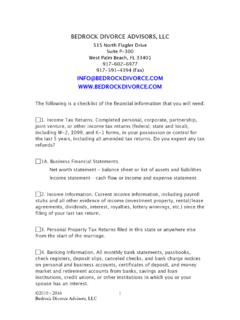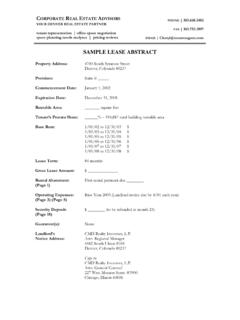Transcription of What Trusted Advisors Do That Others Don’t
1 what Trusted Advisors Do that Others Don t By James A. Alexander what Are the Benefits of Trusted Advisors ? There is a lot of talk in the management consulting industry about the need for turning technical experts into Trusted Advisors . There is a very good reason for this, as no other role in the organization has more potential impact. My experience is that those who achieve Trusted advisor status: Build deeper customer relationships. Provide more complete solutions. Accelerate business development. Are more satisfied in their job.
2 Help their organizations create competitive advantage. Naturally, practice leaders are keen to leverage these talented individuals (and finding/developing more) in order to achieve those results. what Does a Trusted advisor Look Like? The term Trusted advisor is a catchy phrase, but how do you know one when you see one? You can recognize Trusted Advisors by these characteristics: Clients ask for them by name. They are sought out for advice that goes beyond their described expertise. They maintain relationships that aren t just technical.
3 They have such strong personal brands that outsiders seek them out for speaking engagements, writing articles, or special projects. They can have ponytails, wear Hawaiian shirts, make (occasional) smart comments, and executives still love them! How many of your consultants fit that description? Although it varies by organization, on average about 5% fall into the Trusted advisor category. Naturally, it makes sense to expand the cadre of these folks! what Separates Trusted Advisors from Everybody Else? Before trying to hire outside personnel to act as Trusted Advisors or prior to trying to transition your existing consultants into this role, it is vital to know the unique behaviors required.
4 My latest research (see sidebar, About the Trusted advisor Research) provides some direction in learning how Trusted Advisors act differently from Others holding the same job description. Figure 1 shows the seven most important categories of responses from 80 executives regarding the key behavioral differences between these two groups. Forty-eight percent of research participants said that great communication skills are a Trusted - advisor behavior that their top consultants possess that their average performers don t.
5 Here are a few of the responses in this category in the exact words of participants: They communicate the invisible well. Superior creativity in listening to client issues and creating a solution strategy that clearly shows how it solves the problem quickly and thoroughly (the differentiator is the level of creativity, understanding of the issue, and speed with which they react). Superb communicators with clients, team members, and management within our company. They find a way to outline options and the pros and cons to the client in such a way that this becomes the client s direction.
6 Responses about seizing the initiative were given by 30% of the participants. Phrases that capture the essence of what respondents meant include: Offering advice other than just doing what they are told to do! The Trusted advisor may alter the agreement because they do the right thing at the expense of the short-term business, but with longer service payoffs! Looking beyond their role with regard to what would the CEO want to know? Taking ownership of the customer more, whereas average performers take ownership of the problem.
7 Putting the client first was brought up as a differentiator by 24% of the participants. Phrases that represent this category include: Doing the right thing even if it means the organization does not get the work. Always seeking ways to provide a greater value to the customer. They never jeopardize their client relationship in order to close a deal. If they believe the deal is in the customer s best interest, they will make every attempt to convince the customer to purchase it. Over time, clients recognize this and value the engineer s input.
8 Comments related to exhibiting extreme confidence and courage were mentioned by 16% of the respondents. Representative comments are as follows: Courage to deliver competent, clear council to Fortune 500 CXOs. They are fearless in their approach to problem solving. Extremely high levels of confidence. Business acumen was brought up by 15% of all participants: Knowledge both of the client s environment and our take the trouble to understand more, and it pays off. Have a better grasp of overall business needs.
9 Bring a rich portfolio of practical experiences, relationships with Others , and an understanding of business dynamics and market trends. Big-picture thinking responses were made by 11% of the respondents. Comments include: Understand the big picture. Our top performers have a holistic viewpoint. They clearly see the importance and the fit of professional services as part of the overall solution when combined with hardware, software, and consumables. Our average performers fail to leverage the strength and diversity of our entire organization.
10 Have a program-level horizon instead of a project-level horizon. Finally, being very technically strong was brought up by 10% of this group. This was expressed as: They all display tremendous technical knowledge and skills. Very deep technical knowledge. Broad understanding of products and services. There you have the insights of your peers regarding how they distinguish between their star performers and everyone else. This can serve as a good starting point if you assume the goal of trying to get more Trusted Advisors working for you.





